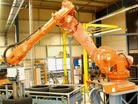Cloud Computing: Enhancing Manufacturing Operations

The majority of companies worldwide utilise cloud computing in their operations today. However different industries have radically different approaches and perspectives.
Manufacturing is an industry where the adoption of cloud computing, particularly on a larger scale, has been fraught with uncertainty. This is despite its status as an indispensable industry 4.0 technology, which can optimise resource usage, foster superior communication and elevate productivity.
The benefits of cloud computing are frequently overshadowed by misunderstandings. Misunderstandings about the root causes of cybersecurity issues, cost expenditure and technological complexity. Manufacturers are hardwired by the expectations and nature of their industry to be conservative because disruption to the status quo of the production line leads to significant costs and challenges.
All of this hesitancy has led many manufacturers to shy away from cloud computing's full potential.
But many doesn’t mean all. Companies in the manufacturing industry like Snowflake, Apollo Tyres and Output Industries, are harnessing the cloud to do truly extraordinary things.
Apollo Tyres & Output Industries: Running Operations Through The Cloud
Apollo Tyres is a multinational tyre manufacturer headquartered in India. Established in 1972, the company has a turnover of US$2.94bn, 18,850 employees and a strong presence across 100 countries. Supplying luxury automotive brands like Audi, Volkswagen and Ford, it has a stake in Output Industries, a UK-based manufacturing software company.
Together with Output Industries, Apollo Tyres is doing something extraordinary: running the manufacturing execution system at its Limda factory entirely through the cloud. The opportunity to do this came about for Apollo Tyres when it replatformed its on-premise system.
“ We had a homegrown system, which was 30, 40 years old,” says Himzy Hassan, Chief Digital and Supply Chain Officer at Apollo Tyres.
“That system ran on the S400, it was nearing its end of life. And we needed to re-platform that.
“We discussed doing it in a very different way. We said, look, technology is moving to the cloud. The cloud provides lots of opportunity services and technology that's unavailable on-prem along with the ability to scale and modernise, which is important in a manufacturing environment.”
In partnership with Output Industries Apollo created the Apollo Manufacturing Execution System (MES) which runs entirely in the cloud. This state-of-the-art industry 4.0 platform tracks production, downtime, cycle time performance, energy consumption and asset utilisation, giving profound insight into optimising and organising manufacturing performance.
This level of cloud integration is unprecedented, even among the most innovative manufacturing firms – and then, Apollo Tyres did something else unprecedented.
“We said, okay, let's pilot it in our biggest ever plant in our biggest plant in Chennai,” says Himzy.
So far this pilot has been a groundbreaking success. Four other Apollo Tyres plants are poised to adopt this system soon, including the company’s Dutch facility in Enschede this summer. Additionally, Output Industries plans to create a white-label version of the system for other businesses to use in their manufacturing processes in the coming months.
“Having an MES system in the cloud naturally promotes the ability for these systems to communicate with each other in a way that a traditional piece of software being run in a factory can’t,” adds Tom Baker, Chief Technical Officer and co-founder of Output Industries.
“With the ability to iterate the cloud naturally promotes standardisation and naturally discourages silos of data. I think the ability to connect those things has been a key part of doing this.”
Himzy emphasises that having an MES system in the cloud has also helped from a material standpoint. “Manufacturing tyres is complex and every tyre part you assemble looks the same,” Tom says.
“So from a quality consistency aspect, the right use of material at the right time and guiding the material movement through the flow is a very complex process. By having these MES tools in the cloud we're able to manage the movement of material better and ensure quality consistency.”
As automotive products grow more complex, with the rise of EV tyres, ever-increasing vehicle novels and growing production numbers, maintaining production efficiency whilst managing this process is crucial.
Advantages of Running Limda through the Cloud for Apollo Tyres:
- The ability to integrate AI services that only run on The Cloud
- Greater manufacturing agility and scalability
- More accessible innovation of processes
- Better prediction and identification of faults and inefficiencies
- The drastic reduction in faults and errors in the production process
- Improved accuracy in inventory
- Reduced waste, improving sustainability
- Enabling economies of scale and coordination between plants
Tom acknowledges the hesitancy from manufacturers towards adopting cloud computing on a larger, more ambitious scale. But he also highlights the cloud-based execution system at Apollo Tyres' Limda factory as an example of how making bold moves with cloud computing can pay off.
“We've proven it can be done," he says.
"You don't need a little box in a corner of your factory running things to feel safe and in control."
If manufacturers are still hesitant about large-scale adoptions of the cloud, they can turn to experts in this space like Snowflake. Snowflake is a global leader in cloud computing, providing innovative, tailor-made solutions for the manufacturing industry on its innovative AI data cloud.
Snowflake: Leading on Cloud AI
Cloud AI refers to the integration of artificial intelligence with cloud computing technologies. This integration can take many different forms, with an AI data cloud being a cloud-based platform designed specifically for managing, storing and analysing large volumes of data using AI.
"Cloud AI democratises access to cutting-edge AI tools, allowing businesses of all sizes to leverage AI to solve complex problems and unlock new opportunities," explains Sundar Pichai, CEO of Alphabet and Google.
Snowflake's AI Data Cloud for Manufacturing is a global network that gives manufacturers superior, simplified access to viewing, managing, integrating and optimising their data.
"It breaks down silos within an organisation, facilitates collaboration with partners and customers and integrates external data and applications for fresh insights," adds Tim Long, Head of Manufacturing at Snowflake.
“Its unique architecture connects businesses across industries, at practically any scale, to bring data and workloads together,"
Snowflake’s AI Data Cloud for Manufacturing simplifies data operations and management, unleashing the power of AI to improve supply chain performance, power smart manufacturing and generate value from connected products.
Snowflake's AI Data Cloud operates as a managed service across public clouds globally, built specifically to leverage the cloud’s flexibility and strength. Traditionally used as a data platform for structured data within the IT domain, Snowflake integrates ERP data from systems like SAP and Oracle, sales data from platforms like Salesforce and many more.
"More recently, manufacturers are integrating OT data from shop floor systems, industrial sensors, photographs, videos and repair documents," Tim notes.
As more manufacturers embrace Industry 4.0 and integrate their IT and OT functionalities, having the capacity to holistically and strategically implement digital transformation solutions across operations is critical.
This sentiment applies strongly to the challenges surrounding cloud computing, which according to Tim is changing the manufacturing landscape in two key ways.
"Firstly, the Cloud provides the scalability needed to bring together massive data volumes and train AI models,” he explains.
“ Secondly, cloud data platforms such as Snowflake make it much easier to build these AI solutions by making AI tools available within their data environment."
These two changes are visible across manufacturing sub-verticals, where Snowflake's AI Data Cloud is being frequently deployed.
Energy companies, for instance, are leveraging first-party and marketplace data to inform trading decisions better. Tech manufacturers empower engineers with AI and machine learning tools to analyse shop floor and product telemetry data. Industrial manufacturers are also building chatbot agents using insights from repair manuals and historical service logs to repair equipment and products efficiently.
"Snowflake has created a seamless and secure network where customers can share data and applications across digital environments,” says Tim.
“Manufacturers can securely share data with key suppliers, customers and partners, ensuring a near real-time view of their supply chain. Some manufacturers are using generative AI and external data from Snowflake's marketplace to refine their business planning processes, gaining insights into customer behaviour and competitive opportunities in the market".
Ultimately, cloud computing in both these instances has opened up a world of new opportunities. Opportunities to improve operations, enhance efficiency and have access to detailed and comprehensive data insights. If you look at these three companies it’s clear that embracing the cloud boldly and holistically can truly pay off.
To read the full story in the magazine click HERE
******
Make sure you check out the latest edition of Manufacturing Digital and also sign up to our global conference series - Procurement & Supply Chain 2024 & Sustainability LIVE 2024
******
Manufacturing Digital is a BizClik brand.


